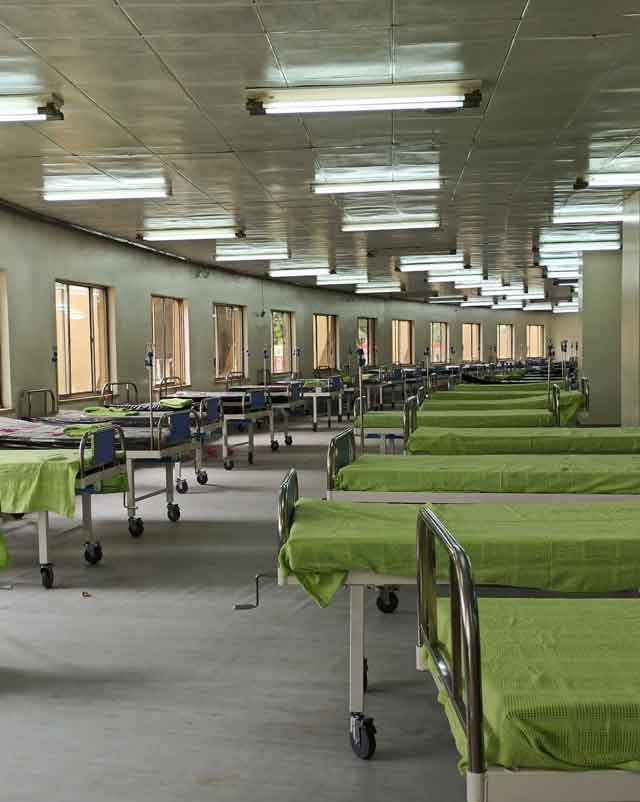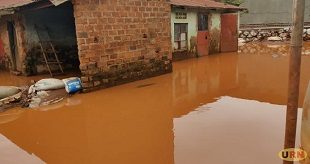
Kampala, Uganda | THE INDEPENDENT | The absence of COVID-19 patients receiving care at COVID-19 wards should not be taken as a sign that the country has won the COVID-19 fight.
According to health experts, the reduction in COVID-19 cases is a sign that the country has completed its first wave and that a second might be on the way. They say this should not be taken as a sign that all is well.
Data from the health ministry indicates that since the beginning of February, there has been a gradual decline of COVID admitted cases. On March 2, 41 people were discharged from different COVID-19 treatment facilities. According to the health ministry, less than 30 patients are admitted to hospitals at the moment.
Hospitals like Gulu regional referral hospital and even Masaka that URN spoke to say their wards are empty. At Mulago National Referral Hospital that once had as many as 500 admitted patients, less than 10 are currently receiving care. The Nambole Stadium auxiliary treatment centre with 1,500 has no patient.
Health workers that we spoke to say due to surges in neighbouring countries like Tanzania that are reporting cases of the disease after being quiet for months, it is important for Ugandans to get vaccinated and be on the lookout.
Muhammad Mubiru, the Principal Hospital Administrator at Entebbe Regional says that though the hospital has been having less than ten patients since February compared to hundreds end of last year, the general public should not take the pandemic lightly.”
To say that there are no cases and hence the country has won the fight is politics. People have politicized the COVID-19 fight, and yet, some people are battling the disease in the hospital while some families are in mourning. COVID is real. A reduction in cases is good does not mean we have seen the worst. Look at the numbers in Kenya, South Sudan and Rwanda. These are our neighbours and our people move in and out of those countries every day,” Mubiru said.
Dr Nathan Onyachi, the Masaka Regional Referral Hospital Director says while it has been five days since they last had a confirmed patient, he says due to the presence of variants, the country cannot relax.
Scientists in the country are trying to analyse what the drop in cases and deaths might mean. As investigation are ongoing, Lt Col Dr Henry Kyobe, the national incidence commander of COVID-19 says the reduction might be a result of a change in the transmission dynamics in the country.
Over 85 per cent of Uganda’s COVID-19 cases have been symptomatic and have not required hospital admission. As such, Dr Charles Olaro, the director of curative services at the health ministry says the picture being painted by the reported cases does not give the complete picture.
“We have noted reductions but we also know that many people are opting for home-based care. So, our health facilities might be empty but that does not mean there’s no disease in communities,” Dr Olaro said.
The health ministry is scheduled to embark on a serosurvey as part of the third COVID-19 rapid assessment. During the assessment, health researchers hope they will be able to get a better understanding of how widespread transmission of the disease is. They will do this by testing for the presence of antibodies among members of the population.
The drop in the number of admitted persons has made some Ugandans wonder why the country is going ahead to plan vaccination exercises. Vaccination against the disease is scheduled to start next week. Dr Kyobe says it is in the best interest of the country and all Ugandans to get vaccinated now.
“When you are dealing with a viral infection, vaccination is the only way that we can deal with and stop infections. We need to vaccinate a big number of people if we want to have a big pool of non-susceptible individuals. The vaccine will also help us avert severe cases of the disease and death,” he explained.
As of March 2, 40,408 cumulative cases of COVID-19 have been reported in the country with 334 deaths. 15,049 people have recovered from the disease.
********
URN
 The Independent Uganda: You get the Truth we Pay the Price
The Independent Uganda: You get the Truth we Pay the Price




So they have stayed at home
what are the modes of treatment in the home?, how many recover fully?, how many have residual effects?
How many burials have occurred in each parish per week since January 2021?
Do we expect them to return to hospital on subsequent exposure to a new strain?
This dry up period as it looks could be used to intensify health education among the communities
As the vulnerable in the community wait for vaccination of front line workers to end, for them to access the
intervention